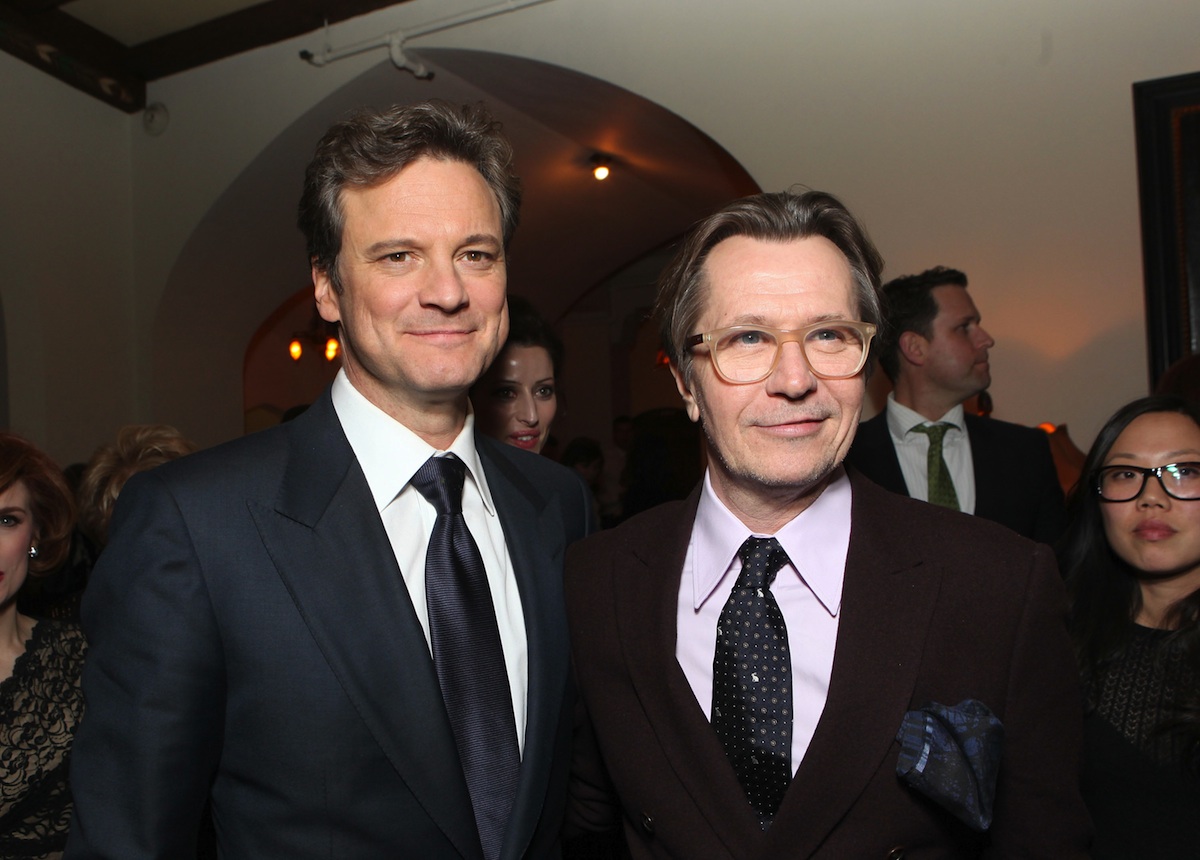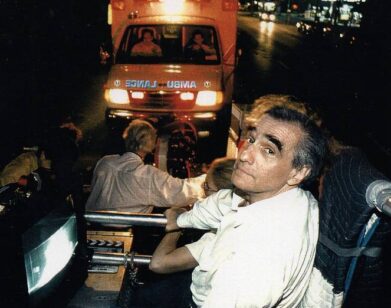Gary Oldman and Colin Firth Join the Circus

ABOVE: COLIN FIRTH (LEFT) AND GARY OLDMAN AT THE PREMIERE OF TINKER TAILOR SOLDIER SPY. PHOTO COURTESY OF FOCUS FEATURES
In a welcome departure from conventional spy thrillers, there are no car crashes in Tinker Tailor Soldier Spy; no explosions or high-tech hijinks—just the kind of intensely masterful storytelling and superb performances that ultimately win Oscars. It’s no surprise that the film was nominated at the 2011 Venice Film Festival for its highest award, the Golden Lion.
Based on John le Carré’s best-selling 1974 novel, Tinker Tailor Soldier Spy plunges the audience deep into the highest echelons of Britain’s Secret Intelligence Service (aka MI6 or “the Circus”), as they investigate the allegation that there is a double agent among them, leaking Cold War secrets to the Soviets. Gary Oldman stars as George Smiley, an esteemed British agent summoned out of retirement to spearhead the search (although he is a suspect himself). Colin Firth plays his debonair colleague and friend, Bill Haydon.
With a plot as intricately, tensely coiled as a cobra about to strike, the film is both elegant and coolly lethal, a fascinating look at how classified information was conveyed in the pre-digital era: instead of smartphones and iPads, analog telephones and manila folders. Tomas Alfredson’s graceful direction and le Carré’s gripping, authentically detailed story (le Carré was a real-life M15 officer) provide unprecedented access to the secret inner corridors of international espionage.
Tinker Tailor Soldier Spy has been popular in Britain since the BBC produced an iconic seven-part miniseries version of the novel in 1979, which starred Alec Guinness as Smiley. “People talked about it all the time,” Firth remembered. “It had a huge presence and a huge impact.” Perhaps the greatest reason for the current adaptation’s immense popularity in Britain (it was #1 at the UK box office for nearly a month, before coming to the U.S.) is its cast, a veritable who’s who of Britain’s leading actors, including Tom Hardy, John Hurt, Mark Strong, Toby Jones, and its stars: Oldman and Firth.
Oldman’s Smiley is described as “wallpaper”—appearing so ordinary that he blends into the background, in order to render him undetectable, so as to not arouse suspicion or call attention to himself. And Oldman’s performance is a masterpiece of restraint. His physicality is almost ascetic in its repose, so that the tiniest crinkle of the mouth, the transient reddening of tearful eyes, the slightest flutter of an eyebrow, telegraphs volumes. His minimalism is all the more astounding for an actor renowned for his often larger-than-life characterizations, including Sid Vicious in Sid and Nancy, Joe Orton in Prick Up Your Ears, Lee Harvey Oswald in Oliver Stone’s JFK, and scores more.
Oldman has long been considered one of the greatest actors who’s never been nominated for an Oscar. This may very well be his year. For his co-star, Colin Firth, the memory of finally winning his own Oscar, for Best Actor as King George VI in The King’s Speech, is still fresh. “It was intense,” Firth said of last year’s awards season. “It was turbulent and very, very exciting and also rather neurotic.”
In Tinker Tailor Soldier Spy, Firth’s character, Haydon, is one of Smiley’s trusted fellow agents. Spies’ lives, however, are amalgams of paranoia and secrets—including the fact that Haydon betrayed Smiley by having an affair with his now-estranged wife, Ann.
“Everybody [in the Circus] has some sort of alternate life or other agenda, whether it’s a broken relationship or some guilt or disappointment,” said Firth, when we spoke with him recently at the Waldorf. “They are all wearing a mask for one reason or another. The beauty of the film is that in a way, it’s a personal, emotional story about hopes and disappointments and loneliness and the failure to find trust or intimacy, not only ‘who did it?’ Smiley has a wife who constantly betrays him, and he takes her back, and I think he also feels that way about this institution and his country. He’s committed no matter how often he’s disappointed.”
“He’s a bit of a sadist,” Oldman told us about Smiley. “He can be quite mean when he needs information. It’s like tickling someone. And he must be a masochist as well. His wife Ann has left many times before and has virtually slept with everyone at the Circus. You don’t get the impression that they argue or talk about the affair. He seems to just accept her, because he loves her. I mean, I’ve certainly had my share of inappropriate relationships like that, where one is willingly a victim. You find yourself in situations like that, where you accept people until you get to a point where you go, ‘I feel that I deserve more than this.’ So it’s more about how you feel about yourself. That’s how I could understand it; I feel that I know those situations and feelings. I applied a lot of my own melancholy.” Oldman has been married four times, most notably to Uma Thurman.
His physical transformation for the role included graying his hair, wearing ’70s-style glasses, and gaining weight. “The glasses are iconic; equivalent to the Aston Martin. Smiley has middle-aged, retired spread, so I had an excuse to basically just eat. I called it ‘eating for George.'”
Oldman has a well-documented, extraordinary capacity for being a chameleon throughout his career. “Part of the fun if the job, to me, is playing different people. I was influenced growing up by Alec Guinness, who of course was the face of George Smiley for many generations. I remember watching all the reruns, in the ’60s and ’70s, those comedies like Kind Hearts and Coronets, where he’d play seven characters and wear wigs and noses and he’s the woman and the grandmother and the head of the school. [Peter] Sellers was another hero of mine, and he did his fair share of dressing up. I was very influenced by that. I like changing your shape and your voice and all of that.
“I guess I just have a facility for it. It’s amazing to me that people can’t act. I don’t mean bad actors—[laughs] you know, just people who find it completely impossible to [be somebody else]… But to me, I see a great guitarist—and I play guitar, but I’m by no means a great guitarist – it absolutely amazes me what they can do and I can’t!” Oldman plays a Martin guitar and a 1910 Gibson. He performed on some the tracks for Sid and Nancy.
“Sid was a stretch,” said Oldman, who prepared by watching videos of Vicious and speaking to people who had known him. “I was not going to go and take heroin, but I wanted to know what it felt like, and I met someone who described it to me as, ‘imagine that your spine is wrapped in cotton.’ That was a sensation that I could understand, that the spine just goes very soft. You look for a feeling or a sensation as a key to the character. With George [Smiley], he’s someone who can regulate his body temperature to the room or the situation that he’s in. It’s like lowering your heartbeat. That was the key for me, because he’s a perfect spy in that sense; he blends in with the room or even the furniture he’s sitting in. He sort of disappears. That’s where the stillness comes from.”
Firth’s character, by contrast, “wants to convince us that he’s a bohemian of some sort, that he’s powerful and bright and charismatic enough to break some rules. He’s not a swaggering nonconformist, but just enough. He paints. Let’s give him red socks or a flowery pocket handkerchief, a little flamboyance, a twist.”
“Hadon’s probably the most mysterious character in a way,” explained Firth, “because the motif of Russian nesting dolls, the dolls-within-a-doll [matryoshka dolls], which were used in the TV series in the opening credits was drawn from a passage in the novel, when Smiley, having just interviewed Haydon, speculates what Haydon is really made of, and he compares him to those dolls: is he motivated by genuine altruistic ideology or is he a narcissistic sociopath?”
Politically, said Firth, the story occurs when “the British empire was very alive as an idea, and so was communism and those ideas made very convenient polarities in people’s political minds. It was not about self-advancement or finance. Many British spies of that era, like Haydon, were educated in the elite system, with considerably above-average intelligence. You have to ask, why would privileged people, who were taking all the benefits of western capitalist society, throw it away to give secrets to a system which has to do with egalitarianism, anti-capitalism, and anti-wealth? To screw the system?”
John le Carré, who served as executive producer on the film, “was there as a resource, if we needed him,” Oldman told us. “John talked to me about the level of paranoia of being on an assignment and waiting for the footsteps on the stairs, if your cover was blown and the game was up. John’s fantastic. He’s 80 years old this year, but it was like hanging out with a 25-year-old, the energy and the memory is so prolific. He was creatively handed the book over to Tomas and said, ‘Please don’t make the book. Do something original with it.'” He did.
TINKER TAILOR SOLDIER SPY IS OUT IN THEATERS TODAY.






